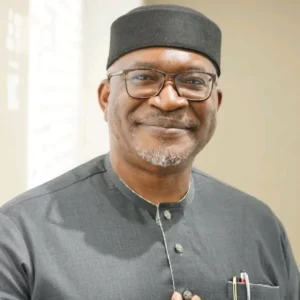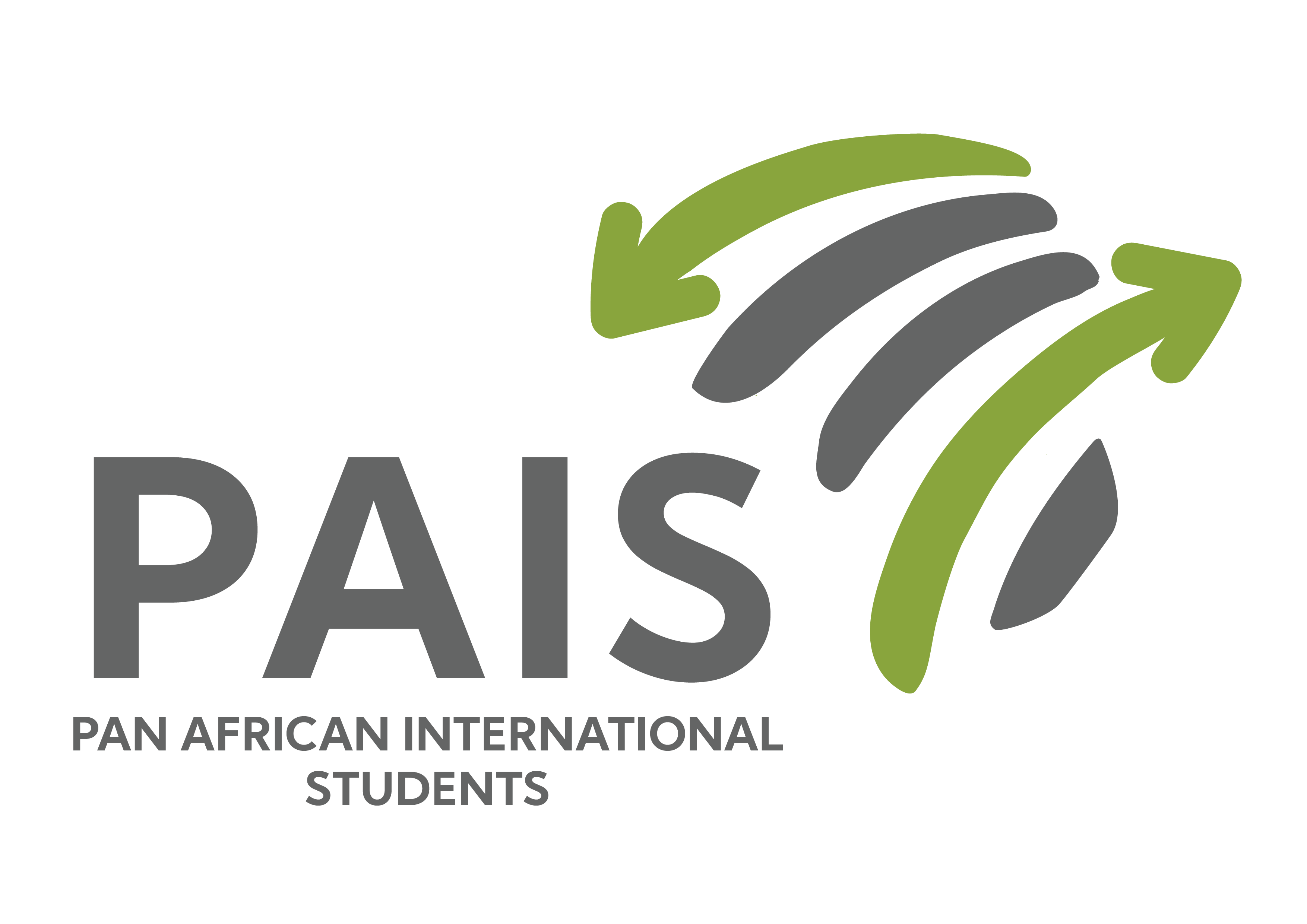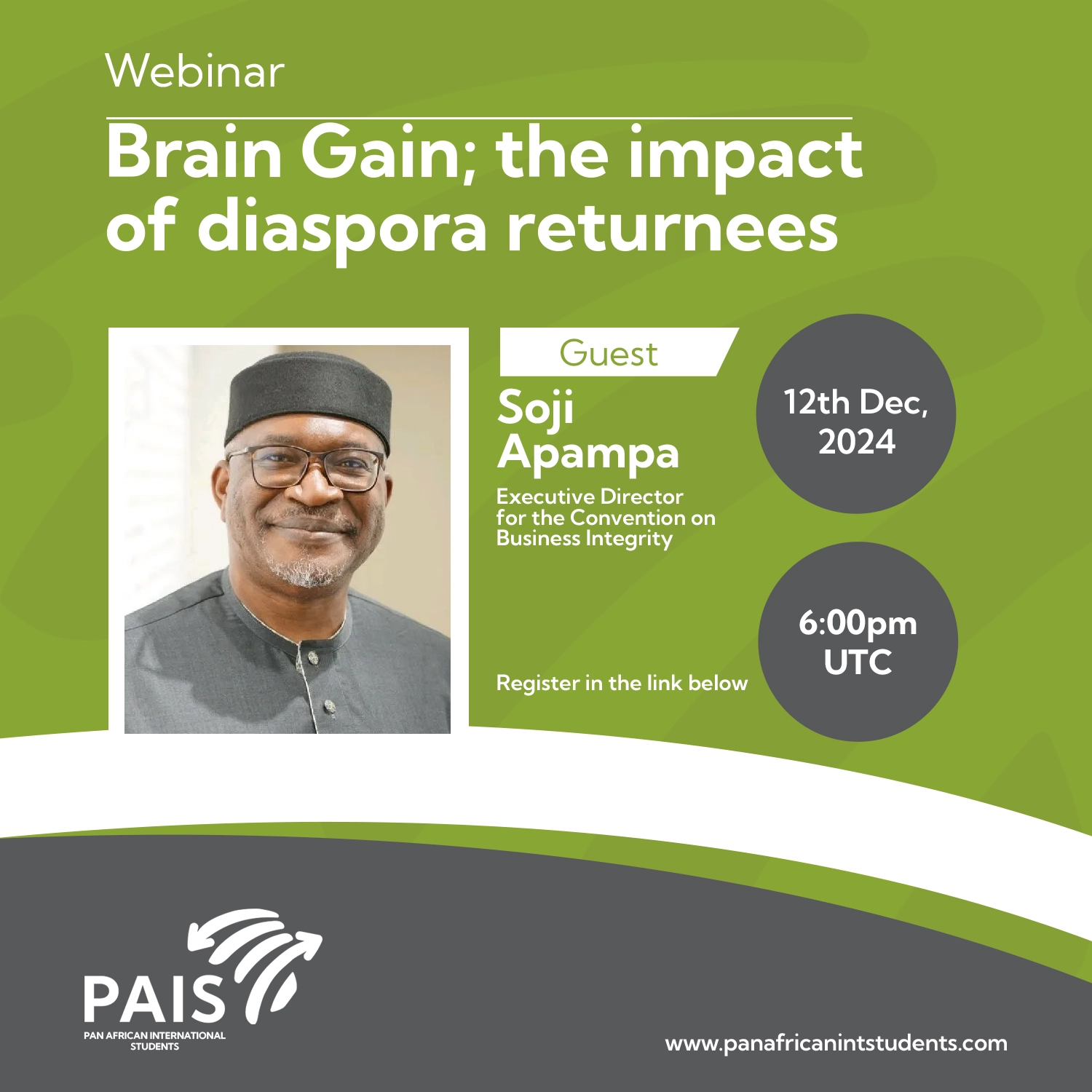On December 12, 2024, Pan-African International Students (PAIS) hosted an enlightening webinar titled “Brain Gain: The Impact of Diaspora Returnees” from 6:00 PM to 8:00 PM. This virtual event brought together participants from across Africa and beyond to discuss the critical contributions of Africans who study or work abroad and return to contribute to the continent’s development. Framed as an exploration of the intellectual, social, and economic value of returnees, the webinar aimed to inspire action among current and future African leaders. Dr. Yaw Perbi, co-founder of PAIS, opened the session by emphasizing the importance of equipping African students with global exposure and skills to drive transformative change at home.
Key Participants
The event was moderated by Apostle Aheto Jacob-Paul, the National Coordinator of PAIS Ghana, who skillfully guided the discussions and facilitated interactions among speakers and attendees. The session began with an opening prayer by Mr. Frank Koomson, an associate of the HuD Group Global Operations. Following this, Mr. Kojo Amissah, Chief of Staff of Kwiverr, delivered a warm welcome address that set the tone for the evening.
Dr. Perbi provided an insightful overview of PAIS’s mission, describing the organization as a platform dedicated to nurturing pan-African leadership. He explained that PAIS envisions a future where the continent’s youth, enriched with international experiences, return to their homelands to make meaningful contributions. This vision was encapsulated in his statement that diaspora returnees are not merely individuals coming back but are “agents of transformation with a global perspective.”
Speaker’s Profile and Keynote Address
 The webinar’s keynote speaker, Mr. Soji Apampa, brought a wealth of experience to the conversation. He is the co-founder of the Convention on Business Integrity (CBi) and a leading advocate for governance and anti-corruption efforts in Africa. Holding a degree in Civil and Structural Engineering from Sheffield University and a Master’s degree in Governance and Finance from John Moores University, Liverpool, Mr. Apampa exemplifies the value of combining academic rigor with practical leadership.
The webinar’s keynote speaker, Mr. Soji Apampa, brought a wealth of experience to the conversation. He is the co-founder of the Convention on Business Integrity (CBi) and a leading advocate for governance and anti-corruption efforts in Africa. Holding a degree in Civil and Structural Engineering from Sheffield University and a Master’s degree in Governance and Finance from John Moores University, Liverpool, Mr. Apampa exemplifies the value of combining academic rigor with practical leadership.
In his keynote address, Mr. Apampa shared his journey of becoming a diaspora returnee, offering a deeply personal narrative of challenges and triumphs. Initially reluctant to pursue education abroad due to fears of cultural and spiritual disconnection, he eventually embraced the opportunity, which proved to be a pivotal decision. His return to Nigeria was marked by a drive to tackle systemic corruption, a challenge he encountered firsthand during a period of severe currency devaluation. This experience motivated him to co-found CBi in 1997, an organization focused on fostering transparency and integrity in both private and public sectors.
Mr. Apampa’s work has been particularly impactful in Nigeria’s maritime industry, where corruption had previously been rampant. Through initiatives implemented by CBi, corruption cases in the industry dropped by over 80% between 2019 and 2023. Additionally, operational inefficiencies, such as excessive port charges and delays, were significantly reduced, demonstrating the power of targeted reforms. Beyond Nigeria, Mr. Apampa has expanded his efforts to other African nations, including Ghana and Senegal, as well as countries like Egypt and Bangladesh. His story underscored how the expertise and determination of a single returnee can spark systemic change across borders.
Key Takeaways
The webinar shed light on the broader implications of the “brain gain” phenomenon. Diaspora returnees are uniquely positioned to bridge the gap between global innovation and local needs, leveraging their international exposure to address pressing challenges in their home countries. Mr. Apampa emphasized that returning is not just about bringing knowledge back but also about applying it in ways that create tangible impact. He encouraged attendees to adopt a solutions-oriented mindset, viewing challenges as opportunities for growth and innovation.
The Q&A session that followed provided a platform for attendees to engage directly with the speaker. Questions ranged from how to overcome the barriers returnees often face, such as resistance to change, to how governments and institutions can better support returnees in their efforts to contribute meaningfully. Mr. Apampa responded thoughtfully, offering actionable insights and encouraging participants to remain committed to the vision of a prosperous Africa.
The Broader Impact of PAIS
PAIS continues to position itself as a catalyst for positive change across Africa. By focusing on empowering African students and fostering a sense of responsibility toward their home countries, the organization aims to create a network of leaders capable of driving sustainable development. The *Brain Gain* webinar was a testament to PAIS’s commitment to its mission, showcasing real-life examples of how returnees are transforming their societies.
As the event concluded, the sense of optimism among attendees was palpable. The stories shared during the session highlighted the incredible potential of Africa’s diaspora to contribute not only to their countries of origin but also to the broader vision of a united, thriving continent. The success of the webinar reinforced the idea that Africa’s greatest resource is its people, and when equipped with the right tools and opportunities, they can achieve extraordinary things.
Conclusion
The ‘Brain Gain’ webinar was more than a discussion; it was a call to action for Africans at home and abroad to reimagine their role in the continent’s future. With inspiring stories like that of Mr. Soji Apampa and the unwavering dedication of organizations like PAIS, the potential for meaningful change is immense. As PAIS continues to nurture the next generation of leaders, events like this serve as a reminder that Africa’s progress is driven by the collective efforts of its people.


